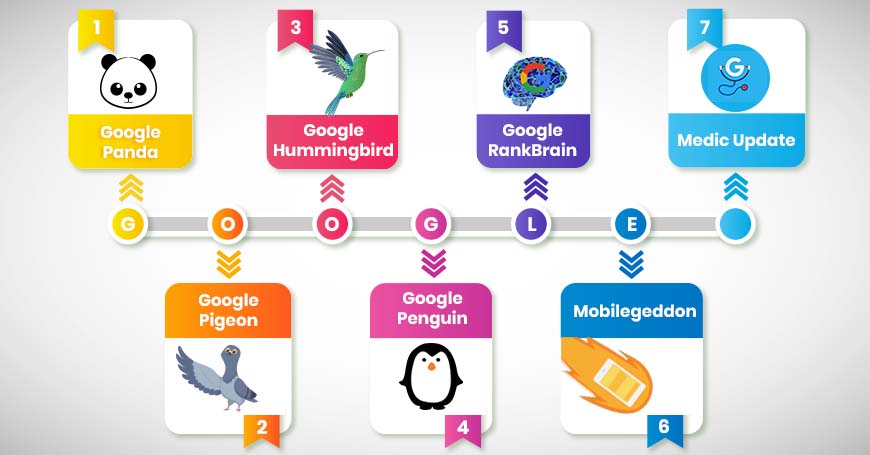

Google capped off 2018 with 3,234 algorithm updates, averaging roughly 9 a day. Why does Google shuffle things so rapidly? The user preferences change and new technologies proliferate consistently, forcing the search engine to evolve and keep pace. Staying significant is a priority for Google and the constant evolution is an effective way to achieve it – plain and simple.
Imagine this! The searches a few years back were fewer and simpler. The social media platforms like Facebook and Twitter were non-existent and so was the mobile traffic. Fast forward to present where traffic upsurge depends on how well we funnel footfall to websites from social and mobile. Google has to update its indexing and ranking systems regularly to accommodate new technologies and tools and deliver a seamless and swift user experience.
Google algorithm changes come in all shapes and sizes – some are elaborate and some minor. Google handles 2 trillion searches annually and any algorithm update is likely to impact any website’s SERP drastically. Your site or your competitor’s site – none is immune. Google has set forth about 200 ranking factors around which a successful digital marketing campaign can be built and run. Many factors are beyond the SEO players while some can be controlled.
Here’s a rundown of a few algorithm updates that every SEO player needs to keep an eye on.
Google identifies and acknowledges crisp, informative and genuine content, and Google Panda is an algorithm update to this end. The algorithm update is tasked with identifying quality content and rewarding it with high organic rankings. Panda is severe on websites with duplicate, plagiarized, error-prone or spun content that’s worthless for the searcher. Thin and overstuffed-keyword content doesn’t go well with the update either. The scene in 2011, the update has single-handedly restored the sanctity of useful, informative content.
With location-based searches growing in volume and variety, Google addresses them with Google Pigeon. The update has been around since 2014, providing searchers with location-based searches. When you enter a search query, Google Pigeon responds by populating websites that are closer to your locations. The lower the distance, the higher the SERPs will be. The update’s overarching objective is to help searchers find businesses within their localities.
Google Hummingbird aims to bring a qualitative improvement in the overall searching mechanism, intuitively. Hummingbird is not an upgrade, instead, it is a fully rewritten algorithm unleashed in 2014. Many webmasters are given to using popular keywords for higher organic rankings, even if the used keywords have no direct or indirect relation to their offerings. The algorithm is all about discouraging this malpractice. Here, the focus is on inferring the searcher’s objective, not what query he/she typed. The results are populated accordingly.
Google Penguin was birthed in 2014 to prevent another black-hat practice – acquiring external links manipulatively from shady resources to boost SERPs. While Panda upholds content quality, Penguin wards off manipulative links. The SERPs of any website using such links plummets, as a penalty. Penguin makes sure of that, in real-time. Plus, the update changed the link building game for good by penalizing backlinks with the exact anchor text. Surprised? Don’t be!
Here’s how it works. You build a backlink, which will be indexed and stored in a database by Google as your website’s link profile’. Over time, Penguin will analyse your link profile and if exactly the same text inside all backlinks is spotted, your SERPs will take a hit.
Think of Google RankBrain an improved, sophisticated version of Hummingbird. Here, machine learning is deployed to recognize the gist of the searcher’s query and populate results accordingly. Unleashed in 2015, the update ensures meaningful searches, fine user experience and better purchase for SEO efforts, making it a win-win proposition for users and businesses alike. Besides content and links, RankBrain is the third most significant factor for SERPs.
Google responded to the unprecedented upsurge in mobile generated queries with Mobilegeddon in 2015. The update weeds out mobile-unfriendly websites and acknowledges the friendly ones to ensure seamless user experience. Here, websites are ranked for their mobile-friendliness – friendlier ones get higher SERPs and vice-versa. The user is, thus, relieved from putting up with unresponsive websites that neither functions nor looks good on mobile.
It’s one of the latest core ‘global’ updates from Google, unleashed in August 2018. The name may suggest the update’s focus on medical and Your Money Your Life (YMYL) websites only but in fact, it impacts all. Post-medic, only great content will not suffice to boost your organic rankings. It has to back the underlying objective of the website – disseminating information or selling products and services – whatever it is. A relevant and constructive website is a requisite.
Google updates aim at creating a friendlier user experience and warding off black hat practices. The webmasters have no choice but to stay updated and in line with the Google updates when creating and executing SEO strategies, or else, their SERPs will take a hit. Recovery is possible but only after long-drawn-out efforts. Like it is said, prevention is better than cure.
Rohit Sharma is post-graduate in English and Business Management. Before taking up writing as a profession, he worked as a Business Development Manager in a web-development start-up. His role mandated him to work in coordination with some of the best SEO experts in Gurugram. When Rohit is not busy creating content strategies, he prefers music, long drives and solace.
A healthy smile is not just a measurement of beauty; it is an indicator of…
Being good on TikTok is about more than just following trends and timing them well;…
Wondering how to boost online sales and customer engagement in your furniture eStore? Take inspiration…
Are you looking to improve the speed of your WooCommerce store to be more efficient,…
TikTok's AI features totally change the way that videos are made because they unveil possibilities…
The aviation sector is growing continuously. Nowadays, airlines use modern technology for better pilot training.…